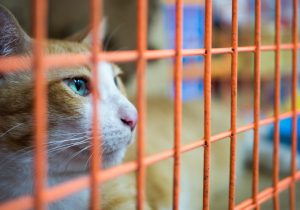9 Ways to Assist Homeless Dogs and Cats
 The third Saturday in August is International Homeless Animals Day, the 21st of August this year, and the day is recognized with events across the globe. The International Society for Animal Rights introduced the holiday in an effort to spread awareness about pet overpopulation. The organization has done meaningful work ever since, including saving the lives of millions of homeless dogs and cats.
The third Saturday in August is International Homeless Animals Day, the 21st of August this year, and the day is recognized with events across the globe. The International Society for Animal Rights introduced the holiday in an effort to spread awareness about pet overpopulation. The organization has done meaningful work ever since, including saving the lives of millions of homeless dogs and cats.
Although there is no governmental organization in the United States to oversee animal shelter regulation nationally, there are approximately 5,000 independently operated animal shelters in the U.S. Most of these shelters changed their focus in the 1990s, making a shift from being temporary animal repositories to proactively helping to control the homeless pet population, and promoting pet adoption. Shelters also sometimes help respond to cat overpopulation with volunteers to conduct TNR programs, in which they trap, neuter, and return cats to where they were found. This tactic serves to greatly reduce both overpopulation and the burden on the shelters to provide care for these animals.
Millions of Homeless Animals Nationwide
According to the American Society for the Prevention of Cruelty to Animals (ASPCA), approximately 6.5 million companion animals enter U.S. animal shelters nationwide every single year. Of those animals, approximately 3.3 million are dogs and 3.2 million are cats. Of those animals, approximately 3.2 million shelter animals are adopted each year, with 1.6 million being dogs and 1.6 million being cats.
How Can We Help?
There are many things we can do as animal lovers to both recognize International Homeless Animals Day, and make a difference for these millions of animals, and here are a few things to consider while doing your part to help.
1 – Spay and Neuter Your Pets.
Spaying and neutering your pets is the single best thing you can do to help prevent pet overpopulation. Endeavoring to prevent the problem at the forefront is key.
2 – Adopt, Don’t Shop.
If you’re considering adding a new pet to your family, please adopt! Consider supporting a local shelter, and giving a home to a dog or cat in need.
3 – Educate Others.
Have important conversations with the people in your life about the seriousness of this issue. Millions of homeless animals depend on us to take notice and take action.
 4 – Think Before You Breed or Buy.
4 – Think Before You Breed or Buy.
There are many shelters and breed-specific rescue organizations that shelter and place purebred animals, many of which would otherwise be euthanized. Do your research, if you decide to purchase a purebred dog do so from ethical breeders who screen their breeding animals for disease.
5 – Keep Your Pet for Life.
It’s important that, before you become a pet owner, you do the research and take this commitment to your pet seriously. It’s not uncommon for dogs and cats to live up to 15 years, and they will be your responsibility for the duration of their lives. Take a look at your lifestyle and priorities before you bring a pet home.
6 – Donate to Shelters.
If you can, donate time and resources to local animal shelters and spay/neuter clinics in your area. Many of these organizations rely on the community to keep them going, and they do amazing work for displaced animals. Monetary donations go a long way, and so does your volunteer time.
7 – Microchip Your Pets.
According to the American Humane Association, an estimated 10 million dogs and cats get lost in the United States every year. Many pets end up in shelters after getting lost. Unfortunately, many times, these pets are not reclaimed by their owners. Do your part to combat this issue by opting to microchip your dog or cat.
8 – Report Stray Pets.
If you see a stray cat or dog, report it. It may be microchipped and belong to someone, or it may be in need of a home.
9 – Fight Puppy Mills.
According to the ASPCA, there are roughly 10,000 puppy mills in the United States. Puppy mills are inhumane commercial dog breeding facilities that often house dogs in overcrowded and unsanitary conditions without adequate food, water, socialization, or veterinary care. They disregard animal health and welfare and exist to turn a profit. If you become aware of these types of operations, please report them.
Standing Together
Together, we can make a difference in the number of homeless dogs and cats in our communities and make sure every pet has a loving home. We can also take active steps to combat overpopulation, and keep healthy, happy pets in the wonderful homes they have. Longwood is here as a resource to help with microchipping, spay/neuter, and anything else our pet owners need. Contact us to schedule an appointment today! We’re here for you and your pets, and we believe in the power of standing together to fight pet homelessness.
